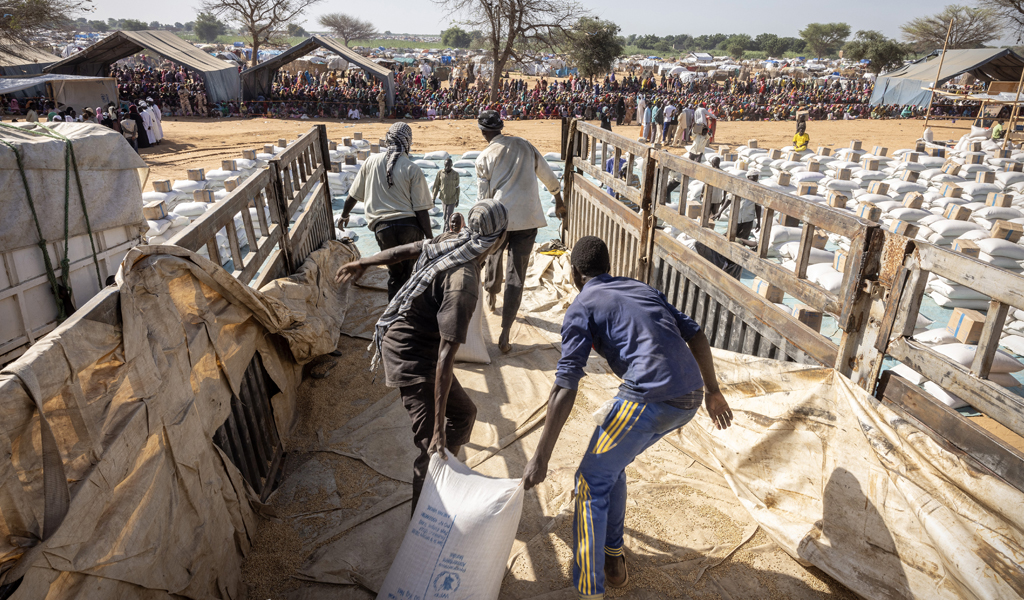For over 10 months, Sudan has been going through a horrific conflict, causing more than eight million people to be forcibly displaced. New research from the Institute of Development Studies (IDS) explores how aid actors can improve their food and cash support, with a focus on how it can be more conflict-sensitive.

As I write this post, since the violence broke out in Sudan on April 15 2023, there have been more than 14,600 fatalities with about 6.3 million people displaced internally and 1.8 million people abroad. The numbers are staggering: 25 million people, of which 14 million children, are in need of humanitarian assistance. With the fighting continuing to spread, the impacts on individual lives include horrific atrocities and sexual violence including rape, loss of homes, assets and livelihoods, and health shocks such as cholera. The conflict has also affected national food availability: at the start of February 2024 an estimated one third of the population was in need of emergency food assistance, according to the Famine Early Warning Systems Network (FEWS-NET).
A critical lifeline for many is food and cash transfers (termed social assistance, a form of social protection). Given the severity of the crisis, and with state-led social protection barely functioning, these transfers are principally provided in Sudan today through the humanitarian response, from community-based systems of mutual aid and solidarity to the more formal programming of international aid agencies. With funding through the IDS programme partnership with Irish Aid, we have undertaken research exploring the conflict sensitivity of this assistance in Sudan during this crisis period.
This builds on the previous IDS research funded by Irish Aid looking at the link between social protection and conflict in the Horn of Africa, with a particular focus on the implications for donors, through case studies from Kenya, Somalia and Sudan. That regional study concluded that policy and programme design needs to articulate more clearly how conflict and social protection affect each other, to embed a conflict-sensitive approach. As we set out in our current study:
“A conflict-sensitive social protection intervention is one that understands how it interacts with the context in which it is implemented and then applies that knowledge to its design, targeting, and delivery systems to minimise harm, ensure that conflict-affected populations can access the programme as intended, and (where possible and appropriate) promote peace and social justice.”
This research, undertaken by Izzy Birch, Hassan-Alattar Satti and Becky Carter, utilised a combination of literature review and stakeholder interviews to investigate the conflict sensitivity challenges presented by the very difficult situation that has developed in Sudan. Here are the key three selected recommendations from the study.
1. How can official aid link with and support grass-roots assistance in a conflict-sensitive way?
Our study joins other research in highlighting that grass-roots organisations in Sudan have proved their worth in appalling circumstances. They are qualified to play a leading role in programming, including for social protection, because of the trust people have in them at the local level, as well as their flexibility and understanding of conflict dynamics. Recommendations for external actors include, above all, recognising the fundamental importance of community-led crisis response and deepening your understanding of how it functions, and of the concerns and priorities of those involved.
2. What would doing more than just avoiding harm look like in fragile and conflict-affected settings, particularly for staff who are preoccupied with implementation?
Conflict sensitivity principles can and should be woven through the project cycle and the social protection delivery chain. Rather than introducing new systems, the study suggests exploring how to improve the quality of, or adjusting, existing processes that in themselves will reinforce conflict sensitivity, such as accountability, analysis, and monitoring. There may be opportunities to benefit from pooling resources and capacities, as well as learning from, and supporting, local organisations which approach conflict and peace as integral to their programming. A critical question is whether a range of local organisations can access long-term funding, share overheads fairly, and enjoy genuine partnerships with international actors (Conflict Sensitivity Facility 2023)?
3. What can donors do to ensure the conflict sensitivity of social protection systems and programmes during rapidly evolving and protracted crises?
Donors can utilise their partnership, financing, and risk management strategies to reinforce conflict sensitivity. The experience over the last year in Sudan has underlined the need to review the lessons for crisis preparedness from April 2023, in terms of investing in scenario-based contingency planning and conflict monitoring; planning for duty of care to staff and partners when violent conflict breaks out; and exploring alternative delivery mechanisms for use in conflict. Other recommendations include exploring ways to strengthen the quality of conflict analysis and ensuring implementing agencies know their partners (including any potential links to conflict and security actors), alongside reviewing grant approval, reporting, and accountability systems to maximise the autonomy available to partners working in conflicts.
While the conflict in Sudan continues and the provision of social assistance leans heavily on humanitarian actors for now, lessons from their practice – and in particular how to provide conflict-sensitive support to the critically important community-led response – may inform and enrich a future state-led social protection system when this is rebuilt.
Read the report: Effective Social Protection in Conflict – Findings from Sudan